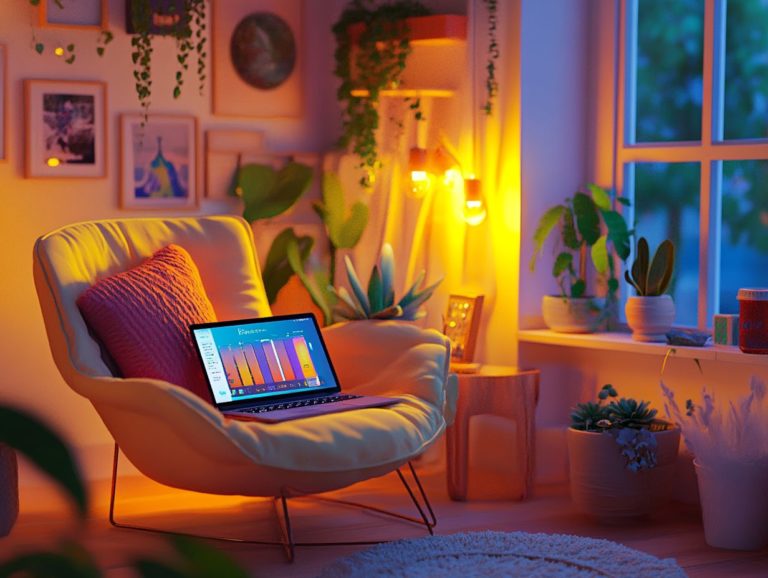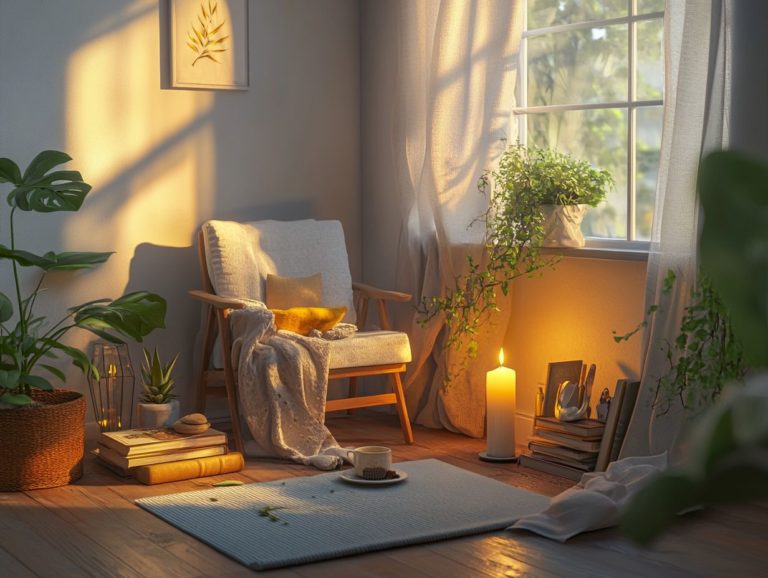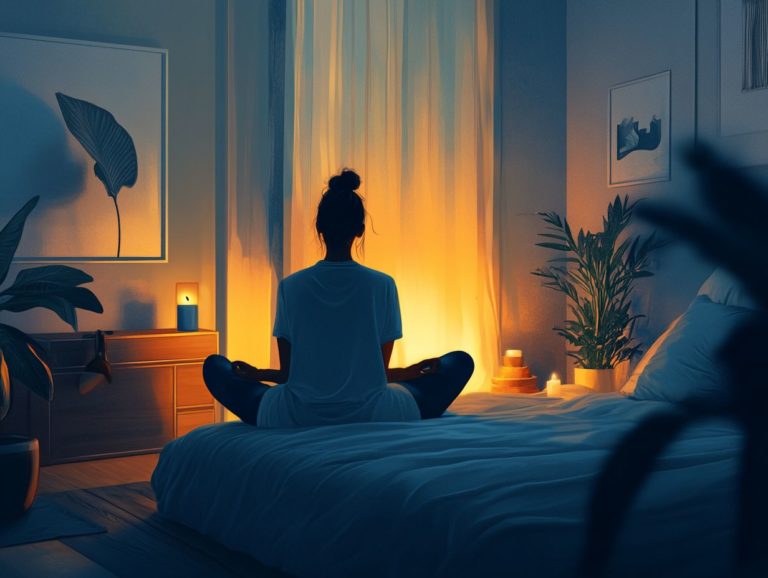The Role of Meditation in Relaxation
In today s fast-paced world, relaxation may seem like a distant dream. Meditation is a powerful antidote, offering substantial benefits for your mental and physical well-being.
This exploration delves into how meditation can effectively reduce stress and anxiety, improve sleep quality, and introduce a variety of techniques tailored to fit seamlessly into your lifestyle.
You ll uncover practical tips for weaving meditation into your daily routine, alongside complementary practices such as yoga and breathing exercises.
You can create a serene relaxation space at home. Join us and discover a calmer, happier you!
Contents
- Key Takeaways:
- The Benefits of Meditation for Relaxation
- Different Types of Meditation
- How to Incorporate Meditation into Your Routine
- Complementary Practices for Relaxation
- Creating a Relaxation Space
- Frequently Asked Questions
- What is the role of meditation in relaxation?
- How does meditation help with relaxation?
- Is meditation an effective way to relax?
- What are the different types of meditation that can help with relaxation?
- Can anyone practice meditation for relaxation?
- How often should one meditate to experience relaxation?
Key Takeaways:
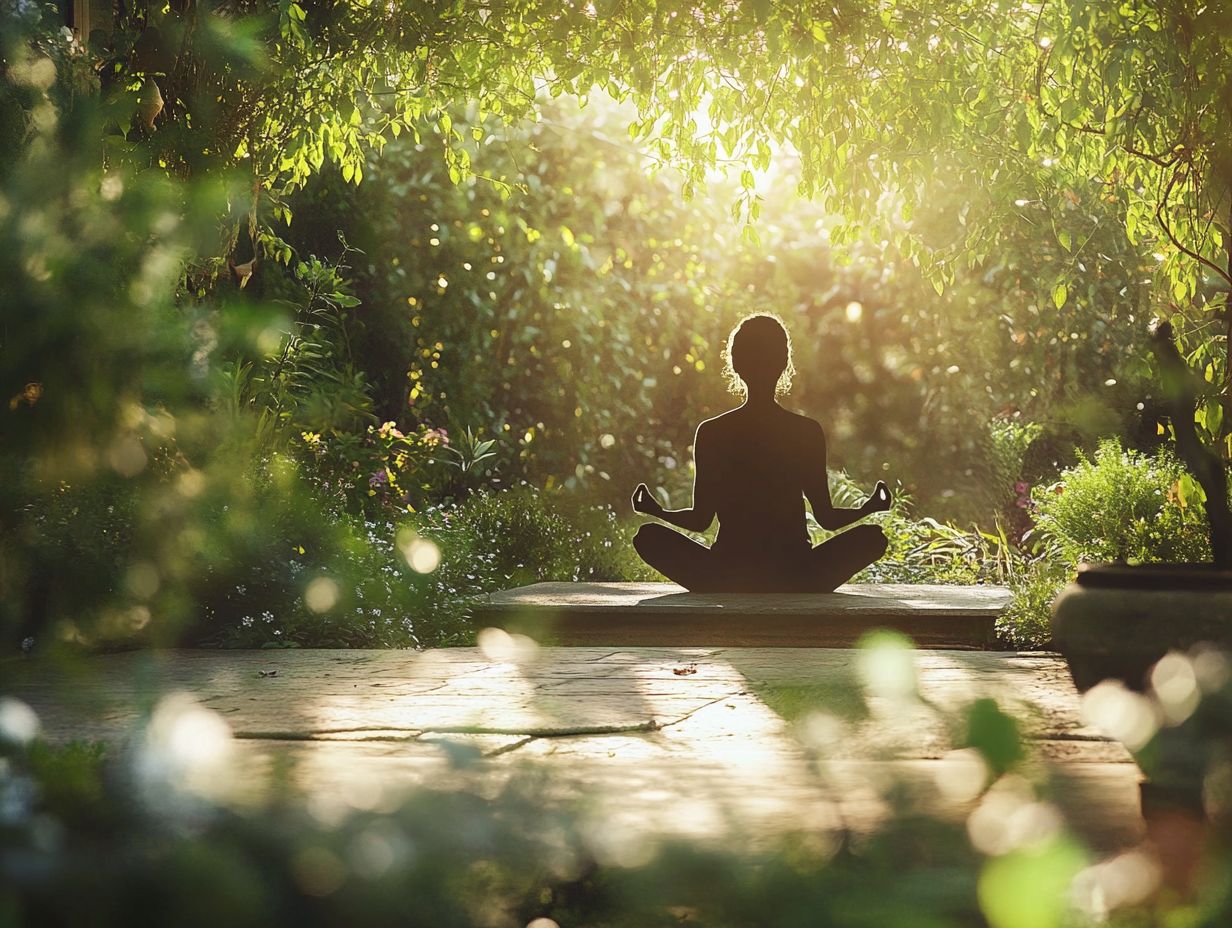
- Meditation is a strong tool for reducing stress and anxiety, promoting relaxation.
- Explore different types of meditation like mindfulness and guided imagery to find what works best for you.
- Make meditation a regular part of your routine and create a relaxation space for greater benefits.
The Benefits of Meditation for Relaxation
The benefits of meditation for relaxation are truly profound, impacting numerous facets of your mental health and overall well-being. This ancient practice includes techniques such as mindfulness meditation and breathing exercises that stimulate the relaxation response within your body, ultimately enhancing brain health and emotional regulation.
Research indicates that regular meditation can significantly boost mental clarity, lower stress levels, and foster a positive mood. Integrating this practice into your daily routine can be a transformative step toward achieving relaxation and inner peace.
Reducing Stress and Anxiety
Meditation serves as an invaluable ally in your quest to alleviate stress and anxiety, functioning as a strong tool for emotional regulation and mental clarity.
Techniques like mindfulness meditation, loving-kindness meditation, and yogic breathwork, a technique that combines breath control and mindfulness, have consistently demonstrated their efficacy in lowering stress hormones within the body. Research, including studies from the University of Massachusetts, reveals that regular mindfulness practice is linked to a notable decline in self-reported anxiety, increased emotional resilience, and an overall boost in well-being. Additionally, incorporating practices like sauna aromatherapy can enhance relaxation; to explore its benefits, check out what is the purpose of sauna aromatherapy?
By directing your attention and nurturing a sense of presence, these practices enable you to cultivate a tranquil mind, allowing you to navigate daily stressors with enhanced grace. The result? A significantly healthier emotional state that enriches your life.
Improving Sleep Quality
Meditation can significantly enhance your sleep quality by promoting relaxation and diminishing your body s stress response.
By incorporating various relaxation techniques into your meditation practice, you can amplify these benefits. Techniques such as deep breathing exercises, progressive muscle relaxation, and guided imagery help create a tranquil atmosphere that calms your mind. When you embrace these methods, especially considering the role of nature in relaxation methods, you not only prepare your body for restorative slumber but also cultivate mindfulness, an approach that fosters awareness of the present moment.
This heightened awareness can reduce anxiety and quiet racing thoughts, facilitating a smoother transition into sleep. As you delve deeper into mindfulness, you’ll begin to notice the psychological benefits manifesting; these include improved emotional regulation and greater resilience to daily stressors, all of which contribute to a revitalized sleep experience.
Different Types of Meditation
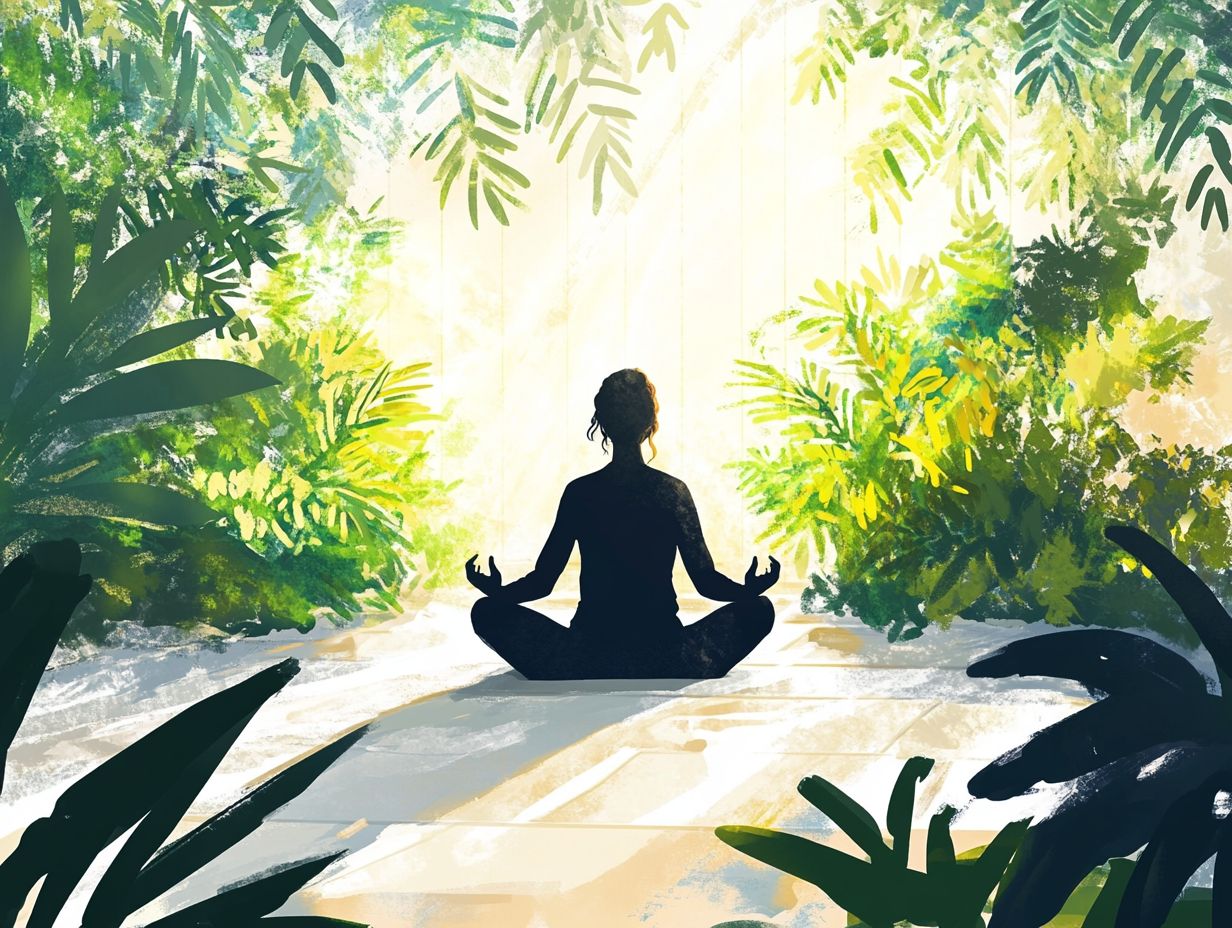
You ll discover a myriad of meditation forms, each presenting distinct techniques and benefits tailored to various needs and preferences. It s crucial for you to explore these options, as finding the right fit can significantly enhance your journey toward relaxation and mental health improvement.
Exploring Various Techniques
Exploring various meditation techniques can lead to remarkable enhancements in your thinking abilities and emotional well-being. Practices like therapy that focuses on being present are especially rewarding.
Incorporating methods like breath awareness and concentration techniques into your routine nurtures inner peace and emotional balance. Breath awareness means simply observing your breath. This practice helps you connect with the present moment.
You can easily blend these practices into your everyday life, whether through dedicated meditation sessions or brief, mindful moments. Over time, consistently applying these techniques sharpens your mental clarity and builds resilience against stress. Incorporating aromatherapy in saunas paves the way for long-term health benefits.
How to Incorporate Meditation into Your Routine
Incorporating meditation into your daily routine has the potential to transform your overall well-being. It serves as a powerful tool to help you manage stress and enhance mental clarity, particularly when practiced consistently.
Tips for Beginners
For beginners, embarking on a meditation practice may initially appear intimidating. Yet, with the right strategies and tools, you can effortlessly integrate this enriching habit into your life.
Exploring meditation apps designed specifically for beginners can greatly enhance your journey. These offer guided sessions tailored to suit various preferences. Starting with shorter sessions perhaps just five to ten minutes provides a gentle introduction that won t overwhelm you.
By focusing on mindfulness techniques, such as observing your thoughts without judgment or engaging in deep breathing, you can cultivate a heightened sense of awareness and presence. It’s also crucial to appreciate the importance of self-discipline in establishing a consistent practice.
Set aside just a few minutes each day, even in brief intervals, to gradually develop your meditation habit. Unlock the numerous benefits it offers!
Complementary Practices for Relaxation
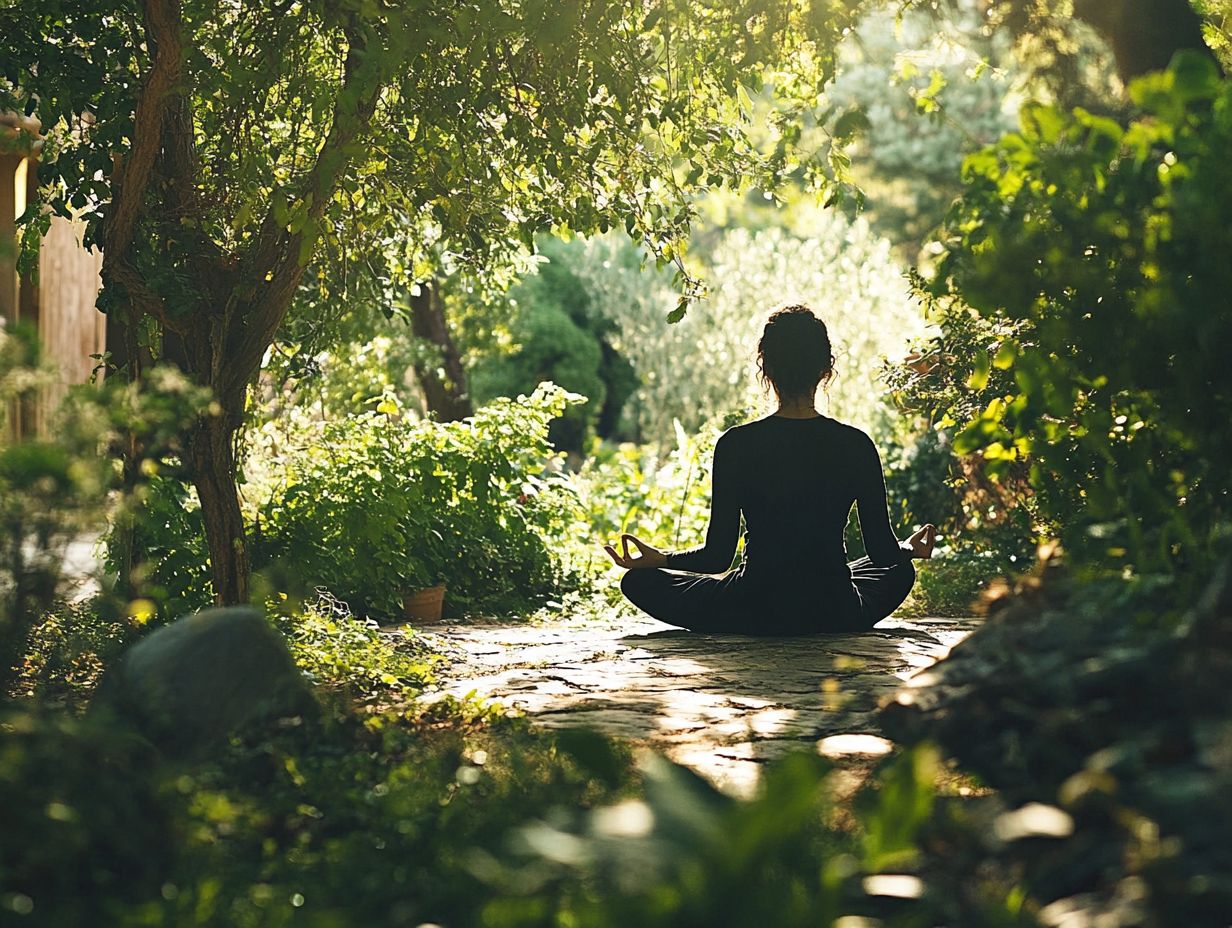
Incorporating complementary practices like yoga and targeted breathing exercises will turbocharge your relaxation response. This holistic approach not only aids in effective stress management but also contributes to your overall physical health.
Yoga, Breathing Exercises, and More
Yoga and breathing exercises are exceptional relaxation techniques that work in harmony with meditation. They enhance your journey into mindfulness and physical well-being.
These practices include various styles; for instance, Hatha emphasizes foundational postures and breath control, while Vinyasa is celebrated for its smooth transitions between movements. Additionally, understanding the role of saunas in detoxification can enhance your wellness journey. By weaving these routines into your daily regimen, you can greatly elevate your meditation experience.
Specific breathing techniques, such as Pranayama, enable you to harness your breath. This anchors your awareness and fosters a deeper connection to the present moment. Additionally, incorporating practices like using saunas to alleviate muscle tension can enhance your relaxation experience. Ultimately, these components create a serene environment that perfectly nurtures inner peace.
Creating a Relaxation Space
Establishing a dedicated relaxation space can profoundly elevate your meditation experience. By curating a serene environment, you invite mindfulness to take center stage. This allows relaxation techniques to flourish in an atmosphere designed for tranquility.
Design Tips and Ideas
When you design your meditation space, think about incorporating elements that help you be mindful and promote physical well-being. Create an atmosphere that encourages relaxation and introspection.
Beyond the basic layout, selecting calming colors can greatly influence your emotional state. Soft blues and greens are often associated with tranquility. Adding nature-inspired touches, like plants or natural wood decor, enhances the sense of peace in your space.
Comfort should also be a priority. Adding cushions or a supportive chair enables you to meditate for longer periods without physical distractions.
Using soft lighting creates a calming ambiance. Consider candles or dimmer lamps for this purpose. Keeping the area free of clutter will ensure it feels open and inviting, fostering a deeper connection to your meditation practice.
Frequently Asked Questions

What is the role of meditation in relaxation?
Meditation plays a vital role in relaxation by calming the mind and reducing stress and anxiety. It allows you to slow down, focus on the present moment, and let go of negative thoughts and emotions.
How does meditation help with relaxation?
Meditation activates the parasympathetic nervous system, which helps the body relax. This response decreases heart rate, blood pressure, and muscle tension, promoting deep relaxation and enhancing overall well-being.
Is meditation an effective way to relax?
Yes, meditation is an effective tool for relaxation. Studies show that meditating regularly can reduce stress and improve your mood.
What are the different types of meditation that can help with relaxation?
There are various types of meditation that aid in relaxation, including mindfulness meditation, guided meditation, transcendental meditation, yoga meditation, and self-inquiry meditation. Each type uses different techniques but all aim to quiet the mind and promote relaxation.
Can anyone practice meditation for relaxation?
Yes, anyone can practice meditation for relaxation. It does not require specific skills or beliefs and can be adapted to fit individual needs. With regular practice, anyone can experience the health benefits of relaxation through meditation.
How often should one meditate to experience relaxation?
It is recommended to meditate for at least 10-15 minutes each day to experience relaxation benefits. However, even a few minutes of meditation can help reduce emotional stress and promote a sense of calm through breathing exercises.
Transform your space today for a more peaceful mind!

